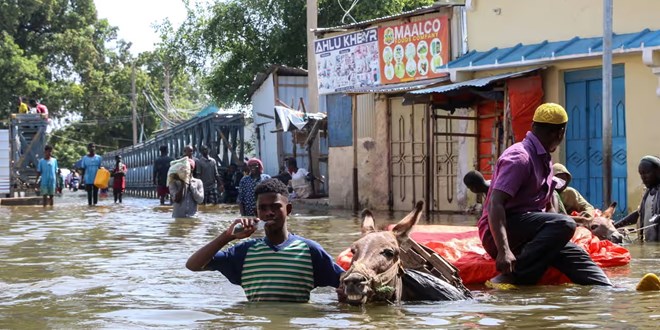[ad_1]

Wednesday November 22, 2023
Reporters from Bilan report from around Somalia as ‘once-in-a-century’ floods hit a country devastated by a six-year drought
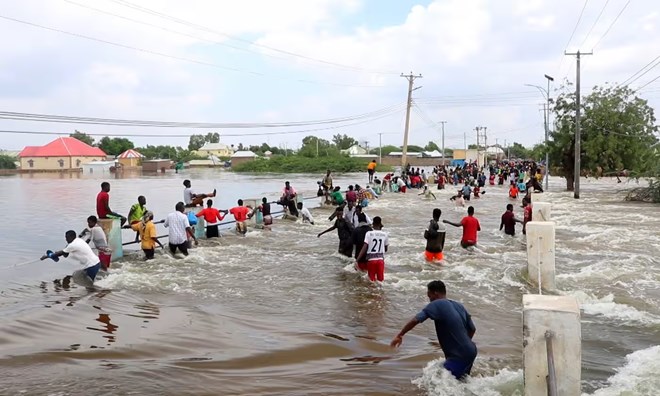
People use a rope to stop themselves being swept away in Beledweyne, Hiran, last week. The floods have displaced almost 500,000 people across Somalia. Photograph: Anadolu/Getty
Just a few weeks ago, Somalis were praying for the heavens to open after a prolonged drought, following an unprecedented six failed rainy seasons, forced many to abandon their cherished nomadic way of life for ever. Now, they are praying for the rain to stop.
Floods, described by the UN as a “once-in-a-century event”, have killed at least 50 people and forced almost half a million to flee their homes. The combination of two climate phenomena – El Niño and the Indian Ocean dipole – with unusually heavy seasonal rains have led to towns, villages, farms and pastures all but disappearing underwater.
One of the worst-affected areas is Baidoa city, the regional capital of South West state. It was known as the “city of death” in the early 1990s, when about a third of the population perished during a famine.
Nurto Aadan Mohamed, a 23-year-old mother of four, lost her husband, Muqtaar Mohamed Kheyr, after torrential rains destroyed her home on the night of 6 November.
“In the pitch darkness, my husband carried the children and me through the flood waters to a neighbour’s house,” she says. “Then he went back home to check on the damage.
“I called and called his phone, but it didn’t go through. At around 11am the next morning, I made my way home and found his body in the house.”
It took more than two days to bury Kheyr because the flood waters prevented people from digging his grave. This was upsetting for his family, as the dead are usually required to be buried within 24 hours under Islamic law.
Mohamed, whose youngest child is three months old, is now living with relatives in a dilapidated house. “We used to rely on the $80 [£64] a month my husband earned working as a cleaner in an orphanage,” she says. “Now we have nothing.”
The UN says 178 camps for displaced people have been inundated in Baidoa, meaning tens of thousands of people, originally forced to leave their homes due to conflict and drought, have had to move again.
Abay Osman Adan, a 33-year-old mother of seven, has had to flee twice since the rains began.
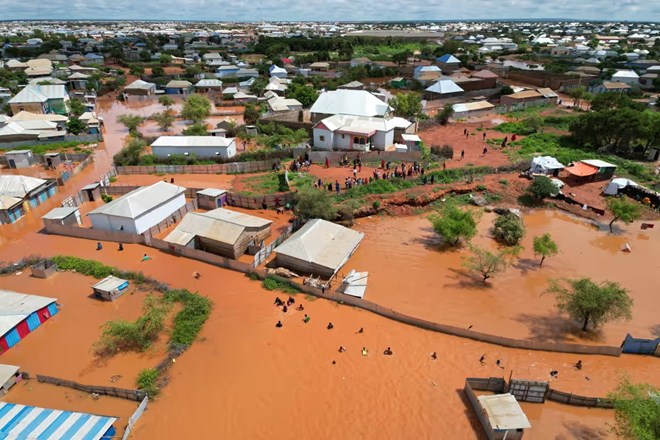
A drone photograph of people wading along the flooded streets of Baidoa, one of the towns worst hit by the floods. Photograph: EPA
“Our home filled up with water so we moved to a relative’s place. After two days it, in turn, was submerged, so we went to another relative’s house in a different part of town,” she says. “All of us are crammed into a single room.”
Adan used to support her family by selling vegetables from a table on the roadside. It was swept away as flash floods swept over ground packed hard as concrete by years of drought.
Her husband, a manual labourer, cannot find work in a city where streets have become rivers and deep mud is everywhere.
Adan says the family will start with nothing once the waters subside; they plan to return to their home and fix it up as best they can. It is difficult for her to find food to feed her family because markets and shops have been destroyed and prices are soaring.
The prohibitive cost of essential goods has prompted Abdinasir Abdi Arush, South West state’s minister for humanitarian affairs and disaster management, to intervene, warning shopkeepers not to raise prices.
He says the regional government and aid groups are doing what they can to help, but far more is needed.
“People are in dire need of clean water because wells have been contaminated by sewage carried by the floods,” says Arush, who fears outbreaks of cholera, malaria and other diseases will follow the floods.
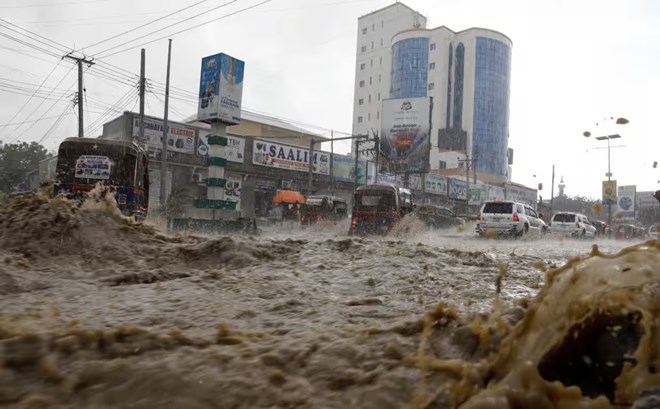
Motorists drive through a flooded street in Mogadishu. Auto-rickshaw drivers have put up their prices as navigating the capital has become harder. Photograph: Feisal Omar/Reuters
Commuters in the capital, Mogadishu, find themselves stranded in the evenings as auto-rickshaw drivers refuse to take them home through flooded streets unless they pay a higher fare.
skip past newsletter promotion
Sign up to Global Dispatch
Free newsletter
Get a different world view with a roundup of the best news, features and pictures, curated by our global development team
It is also difficult to find onions, tomatoes and potatoes; a kilo of onions has quadrupled in price and now costs up to $4 (£3.20).
Hajow Nur Mohamud, 36, a father of seven, has lost his home and his livelihood. He used to earn a living in Mogadishu transporting coal and rubbish on his donkey cart. The animal and its cart were swept away while he was collecting rubbish, and his home flooded.
Mohamud has now moved with his family to a displaced people’s camp on the outskirts of the city. One of his children is in hospital after catching a waterborne disease.
The United Nations World Food Programme (WFP) has said a quarter of Somalia’s population is forecast to face “crisis-level” hunger or worse by the end of this year.
Petroc Wilton, a spokesperson for WFP Somalia, said: “The bombardment of climate shocks, from drought to floods, will prolong the hunger crisis.”
Several parts of the country have been affected by the floods, especially near riverbeds. The UN says about 90% of the central city of Beledweyne is under water after the Shabelle River burst its banks, displacing most of the population. Much of Gedo region in the south is also inundated.
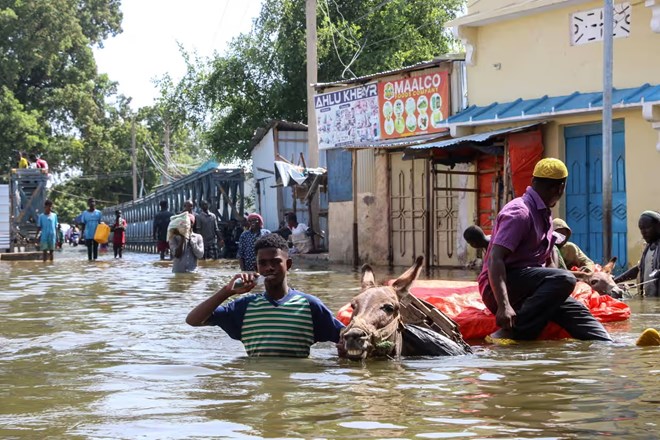
A boy leads a donkey cart through flood water in a submerged street in Beledweyne, one of the worst-hit towns. Flood waters from the Shabelle River, which burst its banks, have killed at least 12 people. Photograph: Said Yusuf Warsame/EPA
Somalia’s Disaster Management Agency says at least 50 people have been killed by the floods. The agency has been airlifting food and boats to the worst-affected areas, although some places are cut off because airstrips and roads have been swept away.
Hundreds of thousands of people living in areas controlled by the militant Islamist group al-Shabaab are cut off from help. It is unclear how many there have died or been displaced.
Parts of Somalia that survived the worst of the drought, such as the fertile district of Afgoye, north of Mogadishu, have not escaped the floods.
Sixty-five-year-old Habibo Adan’s 2-hectare (5-acre) farm was washed away along with the house she shared with her 16 children. The family has now joined the ranks of Somalia’s displaced, sheltering in a single-roomed dwelling.
“I made a decent living growing maize, beans and sesame,” says Adan. “The river burst its banks and took it all away.”
She is determined to return to her homestead as soon as she can, to rebuild her house and restart her life as a farmer. But with heavy rains forecast until at least December, it is unclear when she will be able to return.
Bilan is a groundbreaking all-female media team, covering hard news and in-depth features in Somalia, and making sure women’s voices are heard. Bilan is funded by the United Nations Development Programme (UNDP) and hosted by Dalsan Media Group at offices in Mogadishu.
[ad_2]
